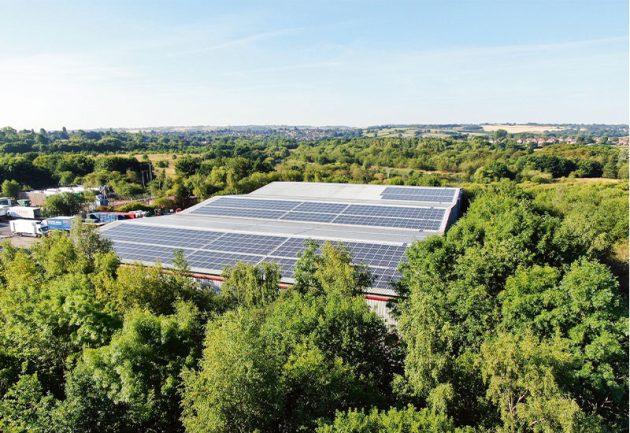
Green Wholesale Collective: Green is the word
We caught up with our sustainability champions, the Green Wholesale Collective, to check on their sustainability success stories
CREED’S 2022 TARGETS ON TRACK
Having set ambitious targets for its sustainability actions last year, Creed Foodservice is firmly on track to become carbon neutral by 2025.
Last year, Derbyshire-based Creed set out its pledge to improve its green credentials with ‘braver, more challenging goals that deliver tangible change, quickly’.
And true to its word, during 2022 Creed has worked with ClimatePartner, a solutions provider for climate action, and achieved the following:
- invested in excess of £75,000 installing more than 2,500 solar panels at four of its five sites, which is estimated to reduce energy consumption by 30%, as well as producing excess energy to feed back into the grid
- reduced fleet emissions by 7.5% as a percentage of turnover; by trialling electric lorries and utilising synthetic fuels for its nationwide fleet, Creed has surpassed its goal, achieving a reduction of 16.9%
- given preference to providers who ensure minimal environmental impact with sustainable practices
- removed all black plastic from its product range
- implemented processes to maintain landfill-free status, with waste being collected and recycled or used for energy
- encouraged staff to play a key role in making suggestions to reduce energy and which physical materials are used in the business
- significantly reduced paper usage by introducing new invoicing processes.
EVERY LITTLE HELPING
“We knew these targets that we set along with the help of ClimatePartner would be a huge challenge for us, but as a team we are rising to meet them,” says Philip Creed, Sustainability Director, Creed Foodservice.
“The concerted commitment to making changes in our day-to-day operations by staff across the board has been incredible. It really is a case of every little helping. We’ve seen real empowerment among employees in all areas of the business and have been bowled over by just how driven everyone is to achieving these goals together. We’ve still got a long way to go to achieve net zero but are tracking well against our targets so far. It’s exciting to think where we might be in a year’s time.”
CARBON NEUTRAL FOR MANUFACTURING SITE
The manufacturing site of Coca-Cola Europacific Partners (CCEP) in Morpeth, Northumberland, is its first GB site to be certified as carbon neutral, meaning there is no net release of CO 2 emissions into the atmosphere.
To achieve this, here are just some of the changes that have helped make a difference:
- a total investment of £3.5 million into the site since 2017 made to improve overall operating efficiency and reduce emissions
- the transition of all warehouse lighting to lower-power LED
- the transition of the site’s forklift trucks from liquefied petroleum gas to lithium-ion electric
- the site’s weekly shutdowns of all service equipment, including machines, pumps and motors, ensuring no energy is wasted during non-production periods.
Morpeth, like all CCEP’s other GB sites, has also been powered by 100% renewable electricity for more than 10 years, which has resulted in a 47% reduction in its carbon footprint since 2010.
Carbon neutral certifications at its sites is just one of the ways CCEP is working towards its ambition to reach net zero by 2040 and reduce its greenhouse gas emissions across the value chain by 30% by 2030 (versus 2019).
Sites are selected to apply for certification based on their previous carbon reductions and, once certified, will continue to work to reduce emissions year-on-year in line with PAS 2060 requirements.
IMPLEMENTATION
Milestones such as these are the result of sustainability initiatives being implemented across all five production sites. The Sidcup site has seen £118m investment since 2017, including a state-of-the-art high-speed canning line capable of producing 2,000 cans per minute, plus a high-tech Automated Storage Retrieval System warehouse, which increased efficiencies across the supply chain and increased storage capacity, helping to save 10,817 road miles by HGV trucks and 3,687 tonnes of CO 2 per year.
PLASTIC
CCEP has also reduced plastic waste and promoted recycling as the first major soft drinks producer to introduce attached caps to its plastic bottles, making it easier to recycle the entire bottle and ensure no cap is left behind.
Production began last year with the intention to have attached caps across the entire range of plastic bottles by the end of 2024.
ADDING VALUE WITH ADVICE
Well known in the sector for its commitment to sustainability, Lomond has now gone one step further, providing advice on food waste and food miles in its latest product guide.
The brochure includes easy-to-follow tips, recipes and serving suggestions to make the most of surplus food and leftovers. It also provides products’ food miles, so customers looking to source local produce can easily identify products throughout the guide.
“We’re delighted to share our latest new lines with our customers, but we wanted to go further to really drive home our messages around sustainability,” says Barbara Henderson, Director. “We’re extremely proud of our ongoing commitment to reducing our environmental impact in a variety of ways, and we wanted to use our brochure to share some of our achievements while also making suggestions for our customers looking to improve their own sustainability credentials.”
DEDICATED ROLE
Keen to maximise impact on its sustainability journey, family run wholesaler Dunsters Farm appointed a transformation manager, tasked with future-proofing the business and improving its green credentials alongside its productivity.
The role was created in 2021 and drills down into detail across the company, with a clear focus on energy usage, reducing waste and other sustainability initiatives.
“Having this role has been a game-changer,” says Tom Mathew, Commercial Director. “Improving a business’s sustainability is a full-time job and not one that can be squeezed into other roles. Knowing this is someone’s focus has ensured sustainability has remained a key focus for Dunsters Farm.”
Highlights from the work carried out already include reducing plastic wrap usage by 71% through investment in new wrap machines and alternative types of wrap, while chiller energy usage has been reduced by 25% by investing in new chiller doors.
“We’re delighted with the results so far,” says Tom. “We have ambitious plans and remain committed to seeing very real results of this hard work.”
WHOLESALER NAMED ‘FUTURE GENERATIONS CHANGEMAKER’
Castell Howell Foods’ Edward Morgan has been named as one of Wales’s top 100 Future Generations Changemakers by the Future Generations Commissioner for Wales.
The list, compiled earlier this year, references Edward’s incredible achievements in his role as group corporate social responsibility & training manager at the Swansea-based wholesaler. Responsible for the group’s CSR activities across its seven manufacturing units and six distribution depots, Edward was recognised for his work to ensure that Castell Howell takes its commitment to the Wellbeing of Future Generations Act seriously, championing local producers, reducing waste and working on an ambitious net zero action plan.
PHILIP DENNIS REAPS REWARDS OF GREENER FUTURE
Truly ahead of its time, Philip Dennis, the family owned wholesaler, made the decision in 2012 to invest in an 80-metre 500kW wind turbine as part of the business’s ongoing efforts to support the environment. This was the single greatest initiative that could be taken to reduce the carbon footprint of the business and to reduce energy consumption, and it has proven a great success.
Two years later, the Caterforce member invested in a second wind turbine and the two turbines produce more than 60% of the wholesaler’s electricity requirements. The business has also installed solar panels at its depots in Barnstaple and Mullacott, which generate more than 340kW of power.
Since then, it has gone on to install three energy storage units. The lithium-ion batteries are the latest renewable technology, providing a combined capacity of 3.75MW and optimising on-site demand and renewable generation, plus helping to balance the national grid when in periods of stress. This helps the system move away from traditional dirty generation to be replaced with intermittent green generation.
In addition to its huge investment in renewable energy, Philip Dennis is also aware of the impact of much smaller changes, such as introducing sensory lights in all of its warehouses and optimising its delivery routes.
“Corporate responsibility and sustainability are key factors in our business strategy,” says Peter Dennis, Director. “We are constantly reviewing our best practice to ensure we remain forward-thinking and positive in our approach to help our customers grow while minimising our impact on the environment.”
GET INVOLVED NOW!
The Green Wholesale Collective is opening its doors for its second year, with wholesalers and brands invited to get involved.
From packing to logistics, transport to energy, there are countless ways the supply chain can improve its sustainability credentials, and the Green Wholesale Collective has been created to champion solutions, raise awareness of best practice, and share knowledge and insight that can really make a difference and inspire others to take positive action.
The planned activity for 2023-24 includes regular webinars covering key sustainability topics, regular coverage in Wholesale News print and online, a monthly e-newsletter, and content on this website.
To find out how you can get involved, simply email stephenie@thebrightmediaagency.com.
Categories Green Wholesale Collective Suppliers Wholesale










